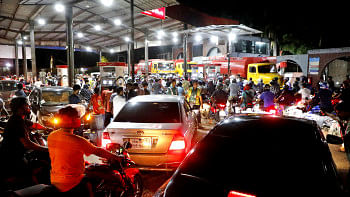Where do the subsidies in the power sector really go?

There is a lack of clarity and transparency when it comes to how much subsidy is being provided to the power sector, why the government is providing it, and in fact, who they are subsidising.
On the matter of fuel imports, specifically imported oil, the explanation the government has provided about the rise in fuel prices is that it is highly subsidised.
On the other hand, in the Bangladesh Economic Review, which is prepared by the government, it is clearly stated that from 2014-15 to May, 2022, no subsidy was provided. In fact, up until that time, the government made a profit of Tk 48,000 crore.
Now, for the power sector, it is being said that the sector is subsidised and the subsidies are gradually increasing. Therefore, to reduce these subsidies, the price of power must be increased.
Upon examining the information provided by the government and the Power Development Board (PDB), we can see that it's true – subsidies are, indeed, increasing. But why is it increasing? Who is receiving these subsidies? These are important questions.
To answer this, let us look at the 11-year period between 2011-12 and 2021-2022. During this time, various private companies that are involved with the power sector were given Tk 90,000 crore. Out of this, nearly Tk 60,000 crore was disbursed among just 12 companies. But they were not given the money to produce electricity; they were given the money to ensure that they did not produce electricity.
What this means is that these companies – that are involved with the power sector – have entered into contracts with the government which stipulate that even if the government does not purchase electricity from them, they will still be paid in the form of "capacity charge".
When the government entered these contracts, they would have known what our electricity demand was and how much electricity was needed to be purchased from these companies. Meanwhile, our power generating capacity has increased quite a lot in comparison to demand. Yet, the government has entered several of these contracts which state that these companies would receive money as capacity charge. And this has racked up an expense of Tk 90,000 crore in the last 11 years, and out of that, 12 companies have received Tk 60,000 crore!
Topping this list of companies is Summit Group, who have received almost Tk 12,000 crore. Other than that, there are UK and Malaysia-based groups that have received almost Tk 14,000 crore, United Group has received Tk 7,000 crore, Orion Group has been given Tk 4,000 crore, Hosaf Group and Mohammadi Group have received Tk 2,000-2,500 crore. Tk 5,800 crore has been spent in the last three years on electricity imports from India, and Adani Group will join this list next.
According to information provided by the Ministry of Power, Energy and Mineral Resources in a recent Parliamentary Standing Committee meeting, in the nine months of the fiscal year 2021-2022, these companies have been given Tk 12,000 crore. This amount was Tk 18,000 crore in the previous year, and just more than Tk 18,000 crore the year before that.
And now, on top of the capacity charge that is being spent despite acquiring no electricity, three LNG-based power plants are being added. These plants are owned by Summit Group, Unit Group, and Reliance Group of India.
So, it turns out that the amount of money that is being paid to Indian groups such as Reliance, Adani, and top Bangladeshi power companies as well as other foreign groups to sit idle is bigger than the loans that Bangladesh is seeking from the World Bank, IMF, and ADB due to its current financial crisis. If efforts were taken to make the local fuel and power sector robust and self-sufficient, even then the amount of money required wouldn't be this large.
The proposal that we had made that included gas exploration and lifting along with the adoption of renewable energy to create an environmentally sound, durable, long term, safe electricity system that would provide power at reduced prices – even that wouldn't have cost this much money.
This is the enormous amount of money that was given to some electricity traders to simply sit idle.
The question, now, is why will the public be held responsible for these thousands of crores of taka that was given to a handful of electricity traders as subsidies?
We didn't get any electricity, but the money, which was given to them, could have been used to restructure the entire fuel and power sector of Bangladesh into a self-sufficient and durable sector.
Now, this burden is being passed onto the people by increasing the price of electricity and by increasing the prices of fuel. The consequence of this is that we are having to pay more not only for electricity and fuel but for everything else too. Our lives are becoming unbearable; a majority of people don't have anywhere to go, and people whose lives were devastated by the Covid-19 pandemic are now having to face this manmade crisis.
The public can't take responsibility for this manner of careless dealmaking. What the public should do is find out who is responsible for these activities, and who might be making these deals in exchange for some commission. This is a form of robbery – robbery of public resources, and the public needs to apprehend those who might be involved in this.
It's unacceptable that every couple of months, the public takes responsibility for these misdeeds and pays more and more money for electricity, for fuel, which makes their lives unbearable.
Transcribed and translated by Azmin Azran.
Anu Muhammad is a professor of economics at Jahangirnagar University.

 For all latest news, follow The Daily Star's Google News channel.
For all latest news, follow The Daily Star's Google News channel. 






Comments